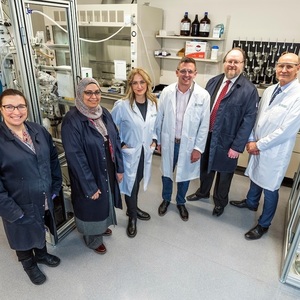Greenfield Global leverages ag clean technology program funding

SOURCE: Greenfield Global Inc.
February 1, 2023
BY Greenfield Global Inc.
Greenfield Global Inc., Canada’s leading alcohol, solvent and biofuels producer, on Jan. 24 welcomed Francis Drouin, Parliamentary Secretary to the Minister of Agriculture and Agri-Food, to Greenfield’s sponsored laboratory space at the University of Alberta to share progress on a $2M agricultural waste-to-clean fuel project funded by Agriculture and Agri-Food Canada under the Agricultural Clean Technology (ACT) Program, Research and Innovation stream.
Greenfield, in close collaboration with the University of Alberta’s Faculty of Engineering, is leading the development of a new clean technology that will convert agricultural waste into renewable diesel fuel. Promoting a circular agriculture economy, this technology has the potential of reducing the overall greenhouse gas emissions in the agricultural and transportation sectors by up to 90 percent when compared to fossil-based diesel fuel.
“Climate change solutions not only help the environment but can also improve the economy and support producers – and projects like this are a great example,” said Francis Drouin, Parliamentary Secretary to the Minister of Agriculture and Agri-Food, on behalf of the Honourable Marie-Claude Bibeau. “This new technology will convert agricultural waste to renewable fuel, add value for producers and boost the energy industry, all while reducing greenhouse gas emissions.”
Advertisement
Advertisement
“Our R&D collaboration with the University of Alberta to produce drop-in, renewable diesel fuel from organic waste will allow farming, trucking, construction, standby generators, and other fossil fuel intensive sectors to decarbonize, which is directly aligned with Canada’s climate action plans and helping Canada achieve net-zero emissions by 2050”, said Howard Field, president and CEO of Greenfield Global. “Greenfield has been decarbonizing Canada’s light-duty vehicle emissions for decades, producing fuel ethanol from industrial corn that is blended into gasoline. We are dedicated to the ongoing development of state-of-the-art technology with our partners in research, agriculture, and industry and we appreciate the Government of Canada’s shared commitment and support for innovative and important climate technologies.”
Additional benefits of Greenfield’s technology include being feedstock agnostic and utilizing a spoke-and-hub approach to the collection of feedstocks, production of biocrude, and the refining of biocrude into renewable diesel.
Advertisement
Advertisement
Three key contributors that supported Greenfield’s funding submission process and helped make this project possible were the Canadian Federation of Agriculture, the Ontario Federation of Agriculture, and the Grain Farmers of Ontario. The collaboration of all parties involved will contribute to the successful commercialization of this technology which will produce a sustainable liquid fuel, improve waste management and reduce greenhouse gas emissions.
Related Stories
The U.S. Department of Energy’s Office of Energy Efficiency and Renewable Energy is soliciting public comments on a preliminary plan for determining provisional emissions rates (PER) for the purposes of the 45Z clean fuel production credit.
On July 17, Iowa’s cost-share Renewable Fuels Infrastructure Program awarded $1.12 million in grants for 20 applicants to add B11 and 4 applicants to add E15 to retail sites. This was the first meeting following the start of RFIP’s fiscal year.
Par Pacific Holdings Inc., Mitsubishi Corp. and ENEOS Corp. on July 21 announced the signing of definitive agreements to establish Hawaii Renewables LLC, a joint venture to produce renewable fuels at Par Pacific’s refinery in Kapolei Hawaii.
A new study published by the ABFA finds that the U.S. EPA’s proposal to cut the RIN by 50% for fuels made from foreign feedstocks, as part of its 2026 and 2027 RVOs, could stall the growth of the biomass-based diesel (BBD) industry.
The U.S Department of Energy Bioenergy Technologies Office, in partnership with the Algae Foundation and NREL, on July 21 announced the grand champion and top four winning teams of the 2023 - 2025 U.S. DOE AlgaePrize Competition.
Upcoming Events










